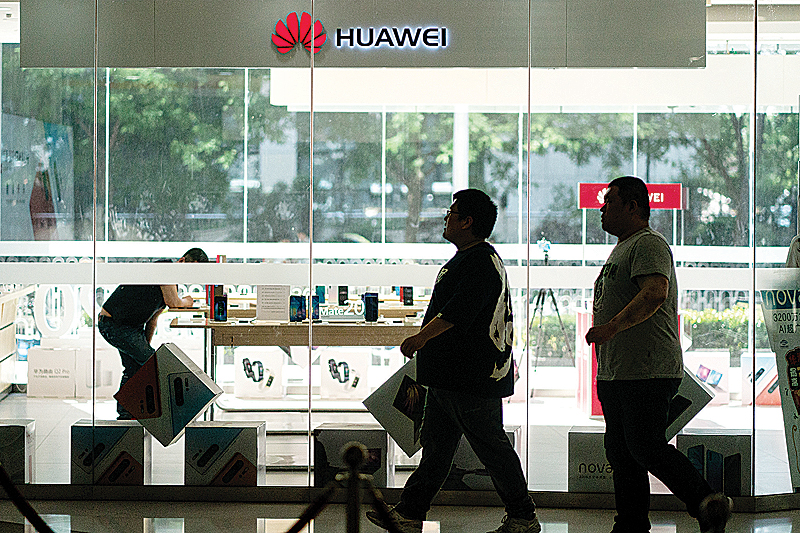Tech firms step away from Huawei after US ban
WASHINGTON: The IMF warned yesterday that the escalating US-China trade war will "jeopardize" 2019 global growth, undermining confidence and raising prices for consumers.
"Consumers in the US and China are unequivocally the losers from trade tensions," Gita Gopinath, the International Monetary Fund's chief economist, said in a blog post. She and her co-authors directly refuted President Donald Trump's claim that the tariffs are paid by China and provide a windfall for the US treasury, saying "tariff revenue collected has been borne almost entirely by US importers."
The economic damage will be even worse if Trump goes through with the threat to impose steep tariffs on all goods imported from China, as that "will subtract about one-third of a percentage point of global GDP in the short term," she said. Optimism was high earlier this month that a deal was within striking distance but tensions erupted after Trump accused Beijing of backtracking on its commitments made over the year of negotiations.
He then more than doubled tariffs on $200 billion in Chinese goods and threatened to hit the remaining $300 billion in products imported each year with 25 percent tariffs.
Trump says a primary goal of the aggressive tariff strategy is to reduce the trade imbalance with China, which totaled $379 billion last year. But Gopinath argues that while the tensions have damaged both countries, reducing overall trade and hurting companies, "the bilateral trade deficit remains broadly unchanged."
And total US imports have not changed significantly since importers simply shifted their purchases to other countries. "While the impact on global growth is relatively modest at this time, the latest escalation could significantly dent business and financial market sentiment, disrupt global supply chains and jeopardize the projected recovery in global growth in 2019," she warned in the blog post.
"This type of scenario is among the reasons why we referred to 2019 as a delicate year for the global economy."
In addition, if tariffs escalate this will make a host of consumer goods less affordable, "harming low income households disproportionately."
Meanwhile, China berated the United States for "bullying" Huawei yesterday as Panasonic joined a parade of foreign companies reviewing their ties with the telecom giant after a US ban linked to security concerns.
Beijing also warned that Washington must show "sincerity" for trade talks to resume after President Donald Trump's moves against Huawei stoked tensions between the world's top two economies.
Commerce ministry spokesman Gao Feng said China has lodged "solemn representations" with Washington, warning that Beijing has the "confidence and ability to protect the lawful rights and interests of Chinese companies." "The US use of state power to arbitrarily exert pressure on a private Chinese company like Huawei is typical economic bullying," Foreign Minister Wang Yi said Wednesday.
Wang warned that Beijing was ready to "fight to the very end" in its trade war with Washington.
Huawei was dealt a new blow as Japan's Panasonic announced it would stop supplying some components to the company.
In an official statement emailed to AFP, Panasonic said it had announced in an "internal notification" that it would "suspend transactions with Huawei and its 68 affiliates that were banned by the US government".
It declined to comment on "other transactions that are not banned by the US". When asked for its response, Huawei pointed to a statement on Panasonic's Chinese website that said the firm was supplying Huawei "normally" and "strictly abiding by the relevant laws and regulations of countries and regions where Panasonic is present".
Japanese firm Toshiba said later yesterday it had resumed shipment of all products to Huawei hours after announcing a temporary halt to check whether US-made parts were involved.
The moves came a day after major Japanese and British mobile carriers said they would delay releasing new Huawei handsets, upping the pressure on the world's second-largest smartphone manufacturer.
Washington's restrictions affect products made fully or partially in the United States, where Panasonic manufactures some of its components, or those that contain some US technology.
Last week, Trump declared a national emergency to bar US companies from using foreign telecoms equipment deemed a security risk-a move seen as targeting Huawei, which Washington suspects of being a potential proxy for Chinese intelligence services.
The Commerce Department has also announced an effective ban on US companies selling or transferring US technology to Huawei, though it later issued a 90-day reprieve.
Earlier this week, Google said it would partially cut off Huawei devices from its Android operating system. Huawei has since indicated that it could roll out its own OS this year in China and internationally next year. Trump's moves came days after he increased tariffs on $200 billion in Chinese goods, prompting Beijing to hike duties on $60 billion in American products.
'Regrettable situation'
The trade dispute has snowballed into a tech war, with Huawei at the epicenter of a battle for supremacy in technologies that could shape the future of the world economy, such as next-generation 5G networks in which the Chinese firm is a global leader.
In Britain, Telecoms giant EE, owned by BT, had been due to bring Huawei's first 5G phone, the Huawei Mate 20X, to Britain, but chief executive Marc Allera said Wednesday the company had "paused" the launch. The delay would last "until we get the information and confidence and the long-term security that our customers… are going to be supported", he said.
The group also said it would phase out the use of Huawei equipment in the most sensitive "core" elements of its network infrastructure.-AFP











